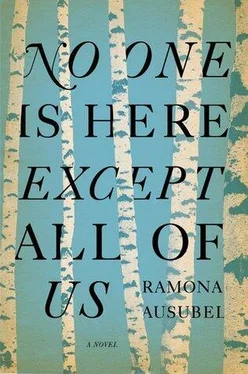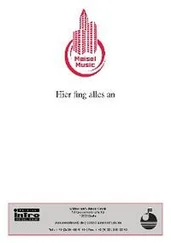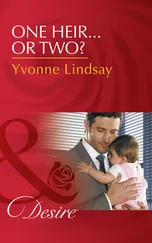“I’m afraid I will lose the baby again when the wound heals over,” the banker’s wife managed.
“It never does. It never heals.”
“Swear it,” the banker’s wife said.
The villagers took their seats. The stranger stood between the animals and the people, under a heavy quilt stretched tight across its corners by four long wooden poles. Both audiences, furry and bald, waited. The healer sat at the piano and pressed his fingers on the keys, which only breathed. We imagined a solemn, lifting song for me to walk by. Kayla had cinched me into a tight corset, which made the tiny breasts I had look much bigger than they were, while my waist was squeezed into a channel just wide enough for the blood to flow through. Kayla had also sewn me a long white skirt and white blouse with a lacy collar, which she buttoned all the way up, her hot breath leaving a film of wet on my neck. “Yes,” Kayla had said, a gust of wind blowing across my legs while she fluffed my skirt. I felt twenty-five years older than I was, or might have been. “You really look like a bride.” I was a convincing doll.
Igor, skinny and awkward, his voice high and creaky but kind, his eyes alight with the turns his life had taken, wore a black suit, a new top hat, glasses and a cane. He only looked ten years older than he was. He and I stood in front of our stranger, keeping as still as we could, and did not smile. Above us was the canopy, a symbol of our home together, where we were meant to share all the nights of our lives.
“We are gathered to celebrate a new family,” our stranger said. “A new family in a new world. We are here to celebrate life, which persists in spite of everything. We are here to celebrate the joining of Lena and Igor, the saddlemaker’s daughter and the banker’s son, who are really everyone’s children. We wish all our prayers on them.” She asked us to take each other’s hands. Igor’s were warm and bony. He gripped my fingers so tightly the blood took leave. The villagers took hold of one another. Our stranger began to read from the Book of Prayers, half singing, half swaying. Here, for the first time, we were hearing the history of our world. We had deposited, but never withdrawn, our prayers. Around us, dust drifted downward in the yellow window-light, horses were quiet and attentive, hens puttered, bats and swallows kept to the eaves.
“We pray for everything we can think to pray for. We pray, of course, for food, and if we have enough we pray that it will always be so. The washed potatoes boiling in a pot are prayed over. The cabbages, severed and pickled, are prayed on. We pray for the lives we know to go on. We pray that everyone has a job to do. We pray that our mothers will live forever. We pray that our fathers will stand up strong until the day when they lie down and rest. We pray that we are smarter than our brothers and that our brothers are kinder than we are. We pray that when we go to count the money hidden under the floorboards it will have grown. We pray that the rain does not wash us away. We pray that the sun will one day heat us again.”
Perl’s glowing head was the brightest spot in the temple-barn. She put her palm up to me and I smiled for her. I wanted to tell her I forgave her, except I was not sure if I did. Vlad cried into his sleeve, left it shimmering with the tracks from his nose. Regina, who had only grown larger since having been traded in for being too large, sat, certain that she would never be the one under that wedding canopy. By the time anyone asked her to marry, she would be taller than the roof, her legs would be trees, her arms would be trees, her head would be who knows what. She was prepared to outgrow everything.
Kayla’s crying was that of an actress, all gasps and whimpers. Hersh offered her his handkerchief, but she had brought her own, a brown lace square so delicate it looked like it would melt with her tears. She remembered the days when I was a baby in her arms. She tried to remember the moment of my birth, the first look I had given her, but she could not. Her time as a mother seemed so short, but she guessed it was always that way. Was it not just last month that those fingers were no thicker than string beans? She looked up at me, at the girl, who really was still a girl, and hoped that I was going to be enough. Hersh knew I would be enough — it was himself and his wife he worried about. It was going to be back to the two of them in the house, and he hoped that Kayla would not take up residence on the floor again, and he would not have to buy anyone else’s children from them. That he would get a saddle or two made every month, and that the rain would one day go and snow would cover them, melt away and cover them back up again.
And me? What did I feel? Thinking of that day, it is as if I were not there. As if someone told me what happened later. I must have made each required movement, passing through the wheels that turned me from a girl to a wife. If there was a transformation, I did not witness it. Still, I was no more afraid of one made-up version of my life than another. I was already far away from anything that had ever been true, and somewhere in this was a surprising sense of peace. I had nothing left to lose.
“I have a question,” Igor said. The stranger looked surprised. “Can you promise that there will be more good than bad in the world, overall? Can we make a rule that I will be happy?”
The stranger studied this boy, this nearly husband. He was standing on the very border between his childhood and his adulthood. She saw Igor as a boy at the window looking out at freshly fallen snow — all the broken branches and thornbushes covered up with sparkling, pure white. “I promise that I will help you try. But it’s your story to tell.” He smiled at me with satisfaction. He was negotiating for both of us.
The stranger resumed her prayer. “We pray that the grandmothers will not die suffering and punish us as ghosts, demanding the sweets we have baked and asking for the only soft bed in the house and scolding us for the things we have left undone. We pray for Lena and Igor and their life together, and for all of our new lives. We pray for the river to stay holy and for any snazzy trick you feel like throwing us: a terrific growing season, a man whose body is made of gold, a girl who bears children weekly. We pray for whatever you have in store, but better, if you can.”
The jeweler handed Igor two gold rings, engraved with vines twisted together. In his head he said his own prayer — May love be mine too someday.
“Do we know about rings?” Igor whispered.
“Definitely,” the jeweler said. “We know about forever, and they are the same thing.” Igor slid one onto my finger, and I slipped the other onto his.
Igor smashed a perfectly good wineglass under his foot and we put our dry lips together for a very short second. Later, the shards of glass would be pressed to the wall in a constellation invisible except when hit by the sun.
The village toasted and celebrated, dancing, singing and wishing for beautiful things under our very own sky. It felt like we might be safe from unhappiness here in the barn. We almost believed it was possible the rain had stopped. The healer sat at the piano, and though it was mute, you never would have known it from his exuberant playing.
Our dream of a dry world had not come true, but we tried not to be too disappointed. In the glimmering dark, their bellies full of food and their heads full of prayers, the village sent Igor and me to our new house to make good on our new marriage. The house had always been there, but no one had lived in it. Vlad had quietly fixed it up, working for a few hours each day, imagining my face while he replaced rotten beams, plastered holes and sanded the floor. He had offered it as a found object, not a made one. To Hersh and Kayla he said, “Maybe Lena and Igor could live in that little house between the two big oaks and the cabbage field?”
Читать дальше












